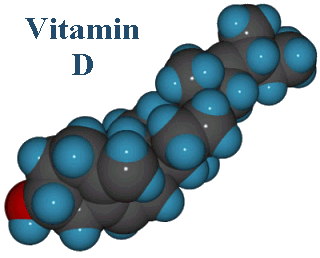 In adults, vitamin D deficiency is associated with osteopenia, osteoporosis, muscle weakness, fractures, cancer, autoimmune diseases, infectious diseases and cardiovascular diseases. And adequate doses might reduce the risk of certain cancers and type 1 diabetes.
In adults, vitamin D deficiency is associated with osteopenia, osteoporosis, muscle weakness, fractures, cancer, autoimmune diseases, infectious diseases and cardiovascular diseases. And adequate doses might reduce the risk of certain cancers and type 1 diabetes.
The current recommendation of 5 mcg (200 IU) may be too little, according to researchers in Maine and South Carolina.
First, the details.
- 112 adult women were given a placebo from March to September 2005.
- They were then randomly assigned to take placebo or a daily vitamin D3 supplement (20 mcg) until February 2006.
And, the results.
- 86 women completed the study.
- The actual D3 content of the supplements was 22 µg per capsule.
- In February 2005 the 25(OH)D blood level was 62 nmol/L.
- This level increased by 35 nmol/L during 25(OH)D supplementation.
- This was significantly more than the 11 nmol/L increase with placebo.
The bottom line?
The authors concluded, “Daily supplementation with 20 µg D3 during winter [4 times the current recommended dose for adult women] achieved optimal 25(OH)D concentrations (at least 75 nmol/L) in 80% of participants, indicating that this dose is adequate to optimize vitamin D status in most young women in Maine.”
The current recommendations by the American Academy of Dermatology for the best sources of vitamin D include “a healthy diet that includes foods naturally rich in vitamin D, foods/beverages fortified with vitamin D, and/or vitamin D supplements.” Sunlight is not a recommended source.
At the end of 2008, the US and Canadian governments announced that the Institute of Medicine would a review vitamin D and calcium research, and this might lead to higher recommended daily intakes.
A historical review of vitamin D can be found here.
3/20/09 11:12 JR